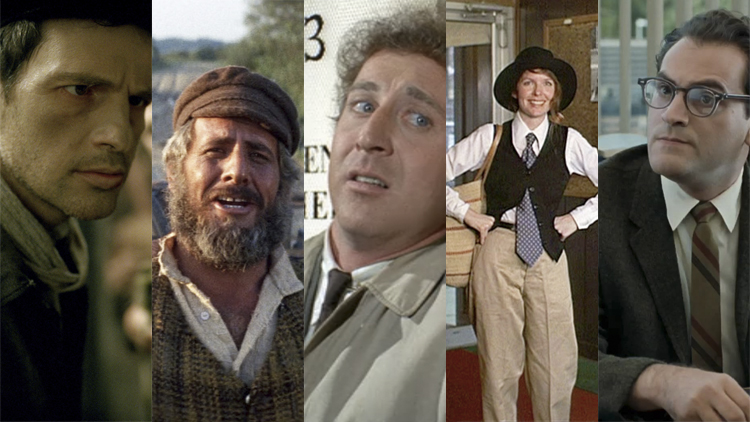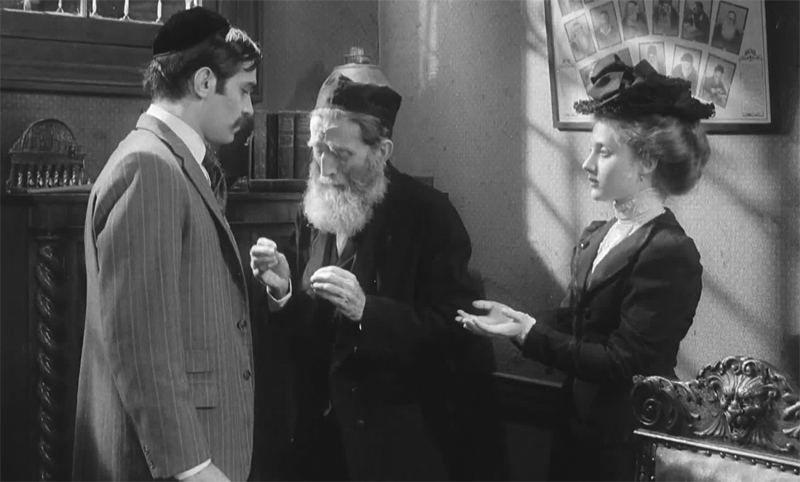 This autumn the UK International Jewish Film Festival marks its 20th anniversary. To help celebrate the rich smorgasbord of films it has offered over the years, as well as giving us a chance to revel in the world of film, JR asked you to vote for your favourite Jewish film. We can now announce the results! And below our panel of filmmakers and critics have chosen their own favourites.
This autumn the UK International Jewish Film Festival marks its 20th anniversary. To help celebrate the rich smorgasbord of films it has offered over the years, as well as giving us a chance to revel in the world of film, JR asked you to vote for your favourite Jewish film. We can now announce the results! And below our panel of filmmakers and critics have chosen their own favourites.
The best Jewish films of all time; here's how you voted…
1 FIDDLER ON THE ROOF (1971) dir Norman Jewison 2 SCHINDLER’S LIST (1993) dir Steven Spielberg 3 ANNIE HALL (1977) dir Woody Allen 4 THE PIANIST (2002) dir Roman Polanski 5 AU REVOIR, LES ENFANTS (1987) dir Louis Malle 6 A SERIOUS MAN (2009) dir Ethan Coen, Joel Coen 7 SHOAH (1985) dir Claude Lanzmann 8 EXODUS (1960) dir Otto Preminger 9 CROSSING DELANCEY (1988) dir Joan Micklin Silver 10 YENTL (1983) dir Barbara Streisand 11 BLAZING SADDLES (1974) dir Mel Brooks 12 THE GREAT DICTATOR (1940) dir Charlie Chaplin 13 THE PRODUCERS (1967) dir Mel Brooks 14 THE PAWNBROKER (1964) dir Sidney Lumet 15 USHPIZIN (2004) dir Gidi Dar 16 SON OF SAUL (2015) dir Laszlo Nemes 17 WALTZ WITH BASHIR (2008) dir Ari Folman 18 CHARIOTS OF FIRE (1981) dir Hugh Hudson 19 THE FRISCO KID (1979) dir Robert Aldrich 20 THE BAND’S VISIT (2007) dir Eran Kolirin
And an honourable mention to other films you noted which weren’t on our list: Wish I Was Here (2014), Once Upon A Time In America (1984), A Kid For Two Farthings (1955).
Jason Solomons JR film editor; BBC film critic; author Woody Allen Film by Film
Au Revoir Les Enfants (1987) dir Louis Malle Louis Malle’s tale of three Jewish boys secretly enrolled at a Catholic boarding school in rural France during Nazi occupation is as heartbreaking as it is beautifully observed. Themes of identity, chilling snobbery and institutional betrayal unfold under a school regime that mirrors the turbulence outside as well as sheltering the boys from it. This film is nevertheless imbued with fondness and tenderness, told with a childlike innocence that is rudely shattered in the final devastating moments.
The Producers (1968) dir Mel Brooks Mel Brooks’ epochal, taboo-smashing comedy features Broadway charlatan (Zero Mostel) and nervous accountant (the late Gene Wilder) as they try to put on the worst play ever, only to see the bad-taste musical Springtime for Hitler become a camp smash hit. Barely 20 years after the event, only Jews could have got away with playing the Holocaust for laughs.
Crimes and Misdemeanors (1989) dir Woody Allen Woody Allen’s most mature and most Jewish work, balances comedy, tragedy, family and guilt with masterly skill. Martin Landau is outstanding as the paterfamilias troubled by a mistress who threatens his reputation; Allen plays a documentary maker having to film a flattering portrait of his odious TV producer brother-in-law.
Judi Herman JR arts editor, BBC broadcaster
Young Frankenstein (1974) dir Mel Brooks Which Mel Brooks film to chose: Blazing Saddles or Young Frankenstein? Gene Wilder, Madeleine Kahn and Marty Feldman, making a trio of much-missed Jewish performers, swing it for me. Evocative monochrome, clever, self- referential plotting, running jokes (‘Fronkensteen’ and ‘Eyegor’), fun with beloved standard musical numbers: “Pardon me boy is this the Transylvania station?” – and not forgetting that monster Schwanzstück . . .
Ushpizin (2004) dir Gidi Dar Dateline Jerusalem, the Festival of Succot. Devout couple Moshe and Mali face impoverishment – and her infertility. Miraculously an unexpected gift and a Succah (the booth they need to celebrate the festival) appear. Another miracle: acquaintances from Moshe’s past arrive, gratefully accepted as ‘ushpizin’ (holy guests). But these boorish men are prison escapees . . . I choose Ushpizin for its honest insight into Orthodox life as well as its humanity and light comic touch.
Salomea’s Nose (2014) dir Susan Korda This gemlike tragicomedy twists and turns to delicately navigate the experience of 20th-century European Jewry – in just 23 minutes. The lush period-feel palate, Jasmin Reuter’s witty, plangent score, clever and unexpected camera angles all result in perfection!
Andrew Pulver Film editor, the Guardian
A Serious Man (2009) dir Ethan and Joel Cohen Until A Serious Man, the Coen brothers hinted only obliquely at their Jewishness (“I don’t roll on Shabbos!” as Walter Sobchak says in The Big Lebowski). However, A Serious Man, an unarguable masterpiece, not only draws copiously from their memories growing up in 1960s Minnesota, but also has all the dramatic heft and thematic brilliance of Saul Bellow or Philip Roth. A multilayered nest of stories (including a prologue that comes on like a Yiddish zombie flick), this film is as mysteriously elegant as it is moving.
Chariots of Fire (1981) dir Hugh Hudson Released in 1981, as Thatcherism got up its head of steam, Chariots of Fire has been somewhat unfairly been bracketed with that era’s resurgent British patriotism. However, the film is really about the forces that brought about the end of the empire. The Jewish half is devoted to sprinter Harold Abraham, who resented the Edwardian amateurism of British athletics and pushed for meritocracy. The film remains one of the few accounts of British Jewry’s attempt to assimilate and is a genuinely stirring story to boot.
Borat (2006) dir Larry Charles Borat is not ‘about’ Jews in the conventional sense, but Sacha Baron Cohen’s creation is so concerned with Jewishness it deserves a special Oscar for cultural self-mockery. From the epic ‘running of the Jew’ scenes in Borat’s home village, to the insults Borat whispers at his Jewish B&B hosts, to the garbled Hebrew that Baron Cohen passes off as Kazakh, the satire of intolerance has never been more deadly. Borat has wider concerns than simply Jewishness, but as one of the best films of the millennium so far, it deserves Jewish respect.
Judy Ironside Founder and President of UK Jewish Film
Watermarks (2004) dir Yaron Zilberman Champion women swimmers of the legendary Jewish sports club Hakoah Vienna in the 1930s stage a reunion with the help of director Yaron Zilberman. They travel from across the world and once again swim in the same pool in Vienna, 65 years after they last swam there together. When these elegant Austrian women enter the water there is a powerful and hugely poignant sense of their survival.
Lemon Tree (2008) dir Eran Ricklis A Palestinian widow (Hiam Abass) must defend her lemon tree field when it is threatened with being torn down by her new neighbour, Israel’s defence minister, who views the grove as a security threat. There are complex layers to the story as an alliance forms between the minister’s wife and the widow. Eran Ricklis brings his experience as one of Israel’s top directors to this highly effective story.
Fugitive Pieces (2007) dir Jeremy Podeswa This is a sensitive Canadian drama about a Greek archaeologist who rescues a Polish child, Jakob, from hiding after his family has been murdered during the war. The archaeologist returns with the child to bring him up at his home on a Greek island. Throughout his life Jakob obsessively returns to his memories and struggles to live his new life to the full.
Mike Leigh Film and theatre director
Hester Street (1974) dir Joan Micklin Silver Healthily free from sentimental Hollywood Jewish schmaltz, this beautiful, honest, low-budget, independent black-and-white film is a masterpiece. Set in 1896 in New York’s Yiddish-speaking Lower East Side, it is a warm-hearted, yet perceptive, study of the immigrant experience, and of the tensions between Orthodox tradition and assimilation. There is wonderful acting, especially from Carol Kane as the bewildered sheitl-wearing young wife, newly arrived from the Old World.
Radio Days (1987) dir Woody Allen Apart from being Woody Allen’s best film by far, ‘Radio Days’ gives us the most real, the warmest and the most accurate portrait of lower middle-class Jewish family life of any movie in the canon. Seen in parallel with the exotic world of the radio programmes they endlessly listen to, an impeccable ensemble of Jewish character actors takes us through the trials and tribulations of the 1930s and 40s. Funny, nostalgic and sometimes profoundly moving.
Kadosh (1999) dir by Amos Gitai This bleak, heightened and relentlessly oppressive Israeli film looks unflinchingly at the appalling misogyny of the charedi (ultra-Orthodox) Jewish community in Jerusalem’s Mea Shearim. Two adult sisters suffer mental, psychological, physical and sexual abuse at the hands of the unbending male religious culture. No praise is too high for the brave courage of Amos Gitai and his crew. Spectacular and essential viewing.
The UK International Jewish Film Festival runs from Saturday 5 - Sunday 20 November. See www.ukjewishfilm.org for info.





